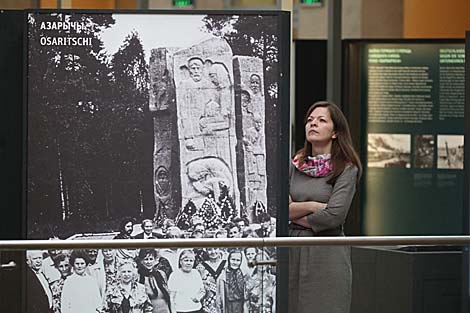Opinions & Interviews
Opinion: By turning to past we involve youth in building peaceful coexistence

MINSK, 18 March (BelTA) – By awakening an interest in the past, we involve young people in building a peaceful coexistence, German Ambassador to Belarus Peter Dettmar said as he spoke at a ceremony to launch the events dedicated to the 75 anniversary of the liberation of the Ozarichi death camp at the National Library in Minsk, BelTA has learned.
“A whole generation was hurt during the German war against the Soviet Union. The attack on it heralded primarily the destruction of moral principles and violation of international obligations. We do not have the right to forget and be indifferent to those terrible events reflected in the book “Polesie: Tragedy and Memory”. We should not only keep the historical knowledge green but convert it into social behaviors so that the understanding of the history should contain an element of moral evaluation. We carry responsibility for the memory about the people deprived of their life during the war. Therefore, it is important to constantly engage with youth, awaken their interest in the past to involve them in building a peaceful coexistence
 According to him, the things that happened in the Ozarichi death camp are not easy to describe. The book “Polesie: Tragedy and Memory” shows the horrors that its prisoners, in particular, its authors Arkady Shkuran and Mikhail Sinkevich, had to survive. To reflect the story of Ozarichi, the traveling exhibition about the Trostenets death camp in the National Library has been replenished with a new stand.
According to him, the things that happened in the Ozarichi death camp are not easy to describe. The book “Polesie: Tragedy and Memory” shows the horrors that its prisoners, in particular, its authors Arkady Shkuran and Mikhail Sinkevich, had to survive. To reflect the story of Ozarichi, the traveling exhibition about the Trostenets death camp in the National Library has been replenished with a new stand.
“Ozarichi put an end to a long chain of criminal actions the German occupying forces committed against disabled people in Belarus. It took a long time to dispel the myth in Germany of the spotless reputation of the Wehrmacht which in fact waged a ruthless war against the civilian population. Today I bow my head before the victims of the Ozarichi death camp,” said Peter Dettmar.
 Ozarichi was a complex of German concentration camps. In March 1944, the 9th Army of the Wehrmacht with General Josef Harpe in command set up three temporary concentration camps near the villages of Dert, Ozarichi, and Podosinnik. These death camps were used to exterminate contagious patients, handicapped and elderly people, women with more than two children, children under ten, and others whom the Wehrmacht considered inapt for work. Before the prisoners were freed by the 65th Army of the 1st Belarusian Front on 17 March 1944, some 9,000-13,000 people were killed there.
Ozarichi was a complex of German concentration camps. In March 1944, the 9th Army of the Wehrmacht with General Josef Harpe in command set up three temporary concentration camps near the villages of Dert, Ozarichi, and Podosinnik. These death camps were used to exterminate contagious patients, handicapped and elderly people, women with more than two children, children under ten, and others whom the Wehrmacht considered inapt for work. Before the prisoners were freed by the 65th Army of the 1st Belarusian Front on 17 March 1944, some 9,000-13,000 people were killed there.







 print version
print version make home page
make home page add to bookmarks
add to bookmarks

